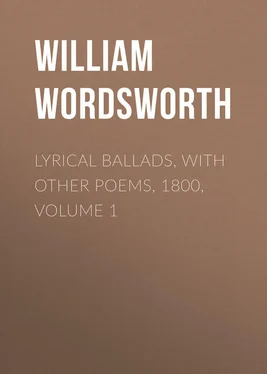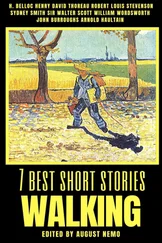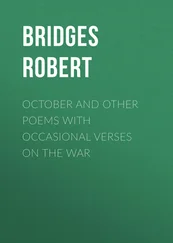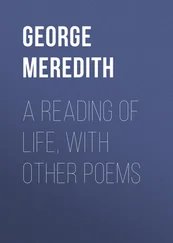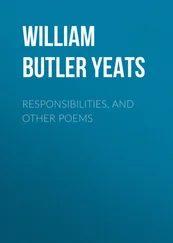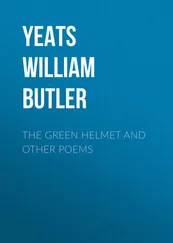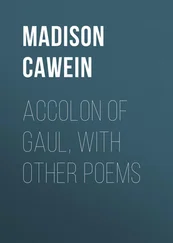William Wordsworth - Lyrical Ballads, with Other Poems, 1800, Volume 1
Здесь есть возможность читать онлайн «William Wordsworth - Lyrical Ballads, with Other Poems, 1800, Volume 1» — ознакомительный отрывок электронной книги совершенно бесплатно, а после прочтения отрывка купить полную версию. В некоторых случаях можно слушать аудио, скачать через торрент в формате fb2 и присутствует краткое содержание. Жанр: literature_19, Поэзия, foreign_prose, foreign_poetry, на английском языке. Описание произведения, (предисловие) а так же отзывы посетителей доступны на портале библиотеки ЛибКат.
- Название:Lyrical Ballads, with Other Poems, 1800, Volume 1
- Автор:
- Жанр:
- Год:неизвестен
- ISBN:нет данных
- Рейтинг книги:4 / 5. Голосов: 1
-
Избранное:Добавить в избранное
- Отзывы:
-
Ваша оценка:
- 80
- 1
- 2
- 3
- 4
- 5
Lyrical Ballads, with Other Poems, 1800, Volume 1: краткое содержание, описание и аннотация
Предлагаем к чтению аннотацию, описание, краткое содержание или предисловие (зависит от того, что написал сам автор книги «Lyrical Ballads, with Other Poems, 1800, Volume 1»). Если вы не нашли необходимую информацию о книге — напишите в комментариях, мы постараемся отыскать её.
Lyrical Ballads, with Other Poems, 1800, Volume 1 — читать онлайн ознакомительный отрывок
Ниже представлен текст книги, разбитый по страницам. Система сохранения места последней прочитанной страницы, позволяет с удобством читать онлайн бесплатно книгу «Lyrical Ballads, with Other Poems, 1800, Volume 1», без необходимости каждый раз заново искать на чём Вы остановились. Поставьте закладку, и сможете в любой момент перейти на страницу, на которой закончили чтение.
Интервал:
Закладка:
I have one request to make of my Reader, which is, that in judging these Poems he would decide by his own feelings genuinely, and not by reflection upon what will probably be the judgment of others. How common is it to hear a person say, "I myself do not object to this style of composition or this or that expression, but to such and such classes of people it will appear mean or ludicrous." This mode of criticism so destructive of all sound unadulterated judgment is almost universal: I have therefore to request that the Reader would abide independently by his own feelings, and that if he finds himself affected he would not suffer such conjectures to interfere with his pleasure.
If an Author by any single composition has impressed us with respect for his talents, it is useful to consider this as affording a presumption, that, on other occasions where we have been displeased, he nevertheless may not have written ill or absurdly; and, further, to give him so much credit for this one composition as may induce us to review what has displeased us with more care than we should otherwise have bestowed upon it. This is not only an act of justice, but in our decisions upon poetry especially, may conduce in a high degree to the improvement of our own taste: for an accurate taste in Poetry and in all the other arts, as Sir Joshua Reynolds has observed, is an acquired talent, which can only be produced by thought and a long continued intercourse with the best models of composition. This is mentioned not with so ridiculous a purpose as to prevent the most inexperienced Reader from judging for himself, (I have already said that I wish him to judge for himself;) but merely to temper the rashness of decision, and to suggest that if Poetry be a subject on which much time has not been bestowed, the judgment may be erroneous, and that in many cases it necessarily will be so.
I know that nothing would have so effectually contributed to further the end which I have in view as to have shewn of what kind the pleasure is, and how the pleasure is produced which is confessedly produced by metrical composition essentially different from what I have here endeavoured to recommend; for the Reader will say that he has been pleased by such composition and what can I do more for him? The power of any art is limited and he will suspect that if I propose to furnish him with new friends it is only upon condition of his abandoning his old friends. Besides, as I have said, the Reader is himself conscious of the pleasure which he has received from such composition, composition to which he has peculiarly attached the endearing name of Poetry; and all men feel an habitual gratitude, and something of an honorable bigotry for the objects which have long continued to please them: we not only wish to be pleased, but to be pleased in that particular way in which we have been accustomed to be pleased. There is a host of arguments in these feelings; and I should be the less able to combat them successfully, as I am willing to allow, that, in order entirely to enjoy the Poetry which I am recommending, it would be necessary to give up much of what is ordinarily enjoyed. But would my limits have permitted me to point out how this pleasure is produced, I might have removed many obstacles, and assisted my Reader in perceiving that the powers of language are not so limited as he may suppose; and that it is possible that poetry may give other enjoyments, of a purer, more lasting, and more exquisite nature. But this part of my subject I have been obliged altogether to omit: as it has been less my present aim to prove that the interest excited by some other kinds of poetry is less vivid, and less worthy of the nobler powers of the mind, than to offer reasons for presuming, that, if the object which I have proposed to myself were adequately attained, a species of poetry would be produced, which is genuine poetry; in its nature well adapted to interest mankind permanently, and likewise important in the multiplicity and quality of its moral relations. From what has been said, and from a perusal of the Poems, the Reader will be able clearly to perceive the object which I have proposed to myself: he will determine how far I have attained this object; and, what is a much more important question, whether it be worth attaining; and upon the decision of these two questions will rest my claim to the approbation of the public.
EXPOSTULATION AND REPLY
"Why, William, on that old grey stone,
Thus for the length of half a day,
Why, William, sit you thus alone,
And dream your time away?"
"Where are your books? that light bequeath'd
To beings else forlorn and blind!
Up! Up! and drink the spirit breath'd
From dead men to their kind."
"You look round on your mother earth,
As if she for no purpose bore you;
As if you were her first-born birth,
And none had lived before you!"
One morning thus, by Esthwaite lake,
When life was sweet, I knew not why,
To me my good friend Matthew spake,
And thus I made reply.
"The eye it cannot chuse but see,
We cannot bid the ear be still;
Our bodies feel, where'er they be,
Against, or with our will."
"Nor less I deem that there are powers
Which of themselves our minds impress,
That we can feed this mind of ours
In a wise passiveness."
"Think you, mid all this mighty sum
Of things for ever speaking,
That nothing of itself will come,
But we must still be seeking?"
" – Then ask not wherefore, here, alone,
Conversing as I may,
I sit upon this old grey stone,
And dream my time away."
THE TABLES TURNED;
Up! up! my friend, and clear your looks,
Why all this toil and trouble?
Up! up! my friend, and quit your books,
Or surely you'll grow double.
The sun, above the mountain's head,
A freshening lustre mellow
Through all the long green fields has spread,
His first sweet evening yellow.
Books! 'tis dull and endless strife,
Come, here the woodland linnet,
How sweet his music; on my life
There's more of wisdom in it.
And hark! how blithe the throstle sings!
And he is no mean preacher;
Come forth into the light of things,
Let Nature be your teacher.
She has a world of ready wealth,
Our minds and hearts to bless —
Spontaneous wisdom breathed by health,
Truth breathed by chearfulness.
One impulse from a vernal wood
Конец ознакомительного фрагмента.
Текст предоставлен ООО «ЛитРес».
Прочитайте эту книгу целиком, купив полную легальную версию на ЛитРес.
Безопасно оплатить книгу можно банковской картой Visa, MasterCard, Maestro, со счета мобильного телефона, с платежного терминала, в салоне МТС или Связной, через PayPal, WebMoney, Яндекс.Деньги, QIWI Кошелек, бонусными картами или другим удобным Вам способом.
1
[Footnote 1: It is worth while here to observe that the affecting parts of Chaucer are almost always expressed in language pure and universally intelligible even to this day.]
Интервал:
Закладка:
Похожие книги на «Lyrical Ballads, with Other Poems, 1800, Volume 1»
Представляем Вашему вниманию похожие книги на «Lyrical Ballads, with Other Poems, 1800, Volume 1» списком для выбора. Мы отобрали схожую по названию и смыслу литературу в надежде предоставить читателям больше вариантов отыскать новые, интересные, ещё непрочитанные произведения.
Обсуждение, отзывы о книге «Lyrical Ballads, with Other Poems, 1800, Volume 1» и просто собственные мнения читателей. Оставьте ваши комментарии, напишите, что Вы думаете о произведении, его смысле или главных героях. Укажите что конкретно понравилось, а что нет, и почему Вы так считаете.
